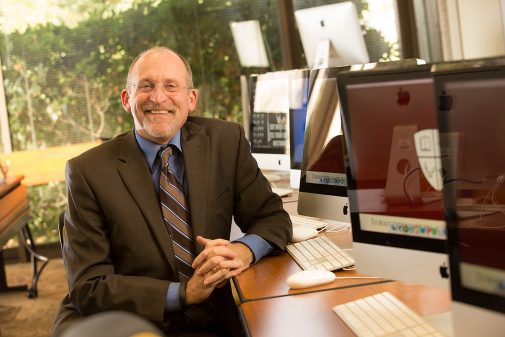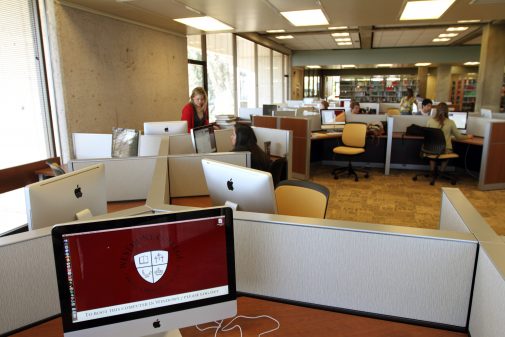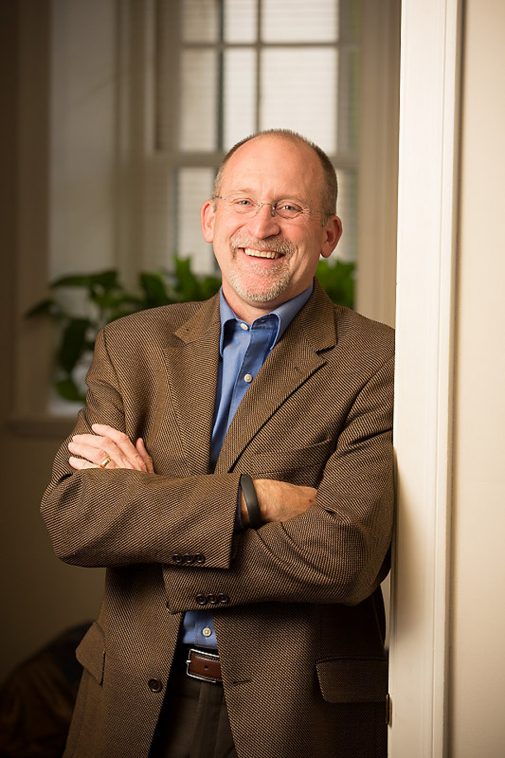Westmont CIO Wins IT Award
By
Westmont

Westmont CIO Reed Sheard has been named a Computerworld Premier 100 IT Leader for 2015. He accepts this award in March with other top IT professionals from the business, education, government, service, technology and non-profit sectors.
Since he arrived at Westmont in 2008, Sheard has employed innovative and resourceful technology to advance the college’s mission. “Reed has revolutionized the way Westmont matches appropriate technology to meet the goals of our faculty, staff and students,” says President Gayle D. Beebe. “He has led by listening then strategically aligning the college with developing technologies and companies to better fulfill our mission without increasing the budget or adding personnel.”
Computerworld honors technology leaders who improve the performance of their business or organization. “Every day, these tech-savvy professionals are positioning their organizations for success by mapping IT projects to strategic business initiatives,” says Scot Finnie, editor-in-chief. “These 100 men and women are using their vast experience in managing people and projects to stay a step ahead.”

The Premier 100 IT leaders for 2015 possess a number of common characteristics, which include: identifying strategic opportunities that IT provides; thinking beyond short-term tactical needs to long-term strategic goals; tying technology and innovation to specific business needs and goals; encouraging staff to innovate; and developing effective partnerships with vendors.
Other recipients include CIOs from organizations such as MasterCard, Intel, NBC, PayPal, Harvard Graduate School of Education, American Cancer Association, Verizon, GE Energy, Airbnb, the White House, Colorado Governor’s Office, Microsoft, UPS and Johns Hopkins.
An early adopter and risk-taker, Sheard has faced numerous IT challenges, such as stabilizing the college’s technology infrastructure and ending frequent IT outages. Limited resources forced him to innovate. In 2009, Westmont became one of the first U.S. schools to build an 802.11n wireless network that provided a high-speed wireless network over the entire campus. Rather than invest in expensive, wired infrastructure of Ethernet cables and ports, Sheard chose to strengthen and improve the wireless network ahead of ratification of 802.11n, making the college a leader in wireless technology. InfoWorld subsequently recognized Westmont as one of the top 100 U.S. IT organizations.

Analyzing the cost and challenge of hosting and maintaining servers for email, the website and digital assets, Sheard decided to move these services to the cloud. The college community uses popular services such Gmail and created a cloud-based enterprise storage service with Egnyte. Westmont has completed more than 20 cloud-based projects without adding budget or staff.
“You have to innovate just enough to solve a real problem or gain an advantage, but you don’t want to over-innovate and spend time and resources on services that don’t benefit users,” Sheard says. “This principle has guided our work so we align our limited resources strategically to serve the college community and our educational mission.”
Early on, Sheard recognized the growing popularity and importance of smart phones and tablets. He guided the development of a free native application for the iPhone and iPod Touch, which included a GPS tracking program for all college shuttles and easily accessible information about the college and campus events, including thousands of lectures uploaded to iTunesU. The college also created an iPad app for the Westmont Magazine. Westmont has moved to make its website fully mobile-friendly.
In 2010, Sheard worked with librarians to modernize technology in the library to better serve students. Removing stacks of reference books freed up space on the main floor for various structured learning spaces: numerous new conference areas, collaborative learning environments, walking stations with an integrated desk for the kinesthetic learner, a new open lab area, and a library instruction lab. Seating areas also feature more than 200 new power-outlet tracks where students can plug in laptops and other mobile devices.

For seven years, Westmont employees have used Salesforce, which provides those who are traveling with easy and secure access to important information. One of the first schools to adopt Salesforce for use in fundraising, the college has become a leader in this emerging area within higher education.
The magazine eCampus News chose Westmont from nearly 4,500 colleges and universities as the eCampus of the Month for January 2012, noting that it “implemented predictive modeling and cloud-computing programs to save money and spend budgets efficiently, becoming a model for small schools looking for ways to survive the slumping economy.”
Since 2013, students enrolled in Europe Semester have received an iPad mini loaded with academic coursework from about 20 books. The professors use the tablets to strengthen and enhance student learning, and the devices reduce the weight of the course material by 90 percent while lowering the cost of textbooks to students.
Sheard also serves as vice president for college advancement at Westmont. Previously, he worked as vice president for technology services at Spring Arbor University in Michigan for five years. He graduated from the University of Sioux Falls and earned a Master of Divinity at Fuller Theological Seminary and a doctorate in higher education leadership from Seattle University. Before joining the staff at Spring Arbor, Reed worked at Apple Inc., Informix Software, a division of IBM, and as an assistant professor of leadership studies at George Fox University.
Filed under
Faculty and Staff, Featured, Press Releases